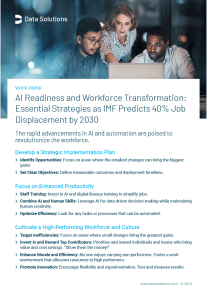Frequently Asked Questions
What are the key benefits of implementing AI in business operations?
+-
Implementing AI in your business operations can significantly streamline processes, improve efficiency, and enhance decision-making. AI solutions can automate repetitive tasks, allowing your team to focus on high-value activities. This not only reduces operational costs but also leads to improved customer satisfaction. By leveraging AI, businesses can achieve an average ROI increase of 20% through enhanced productivity and faster workflow optimization.
How can small businesses benefit from AI implementation?
+-
Small businesses can leverage AI to compete with larger organizations by enhancing their operational efficiency and customer engagement. With AI tools, you can automate marketing processes, improve customer service through chatbots, and gain insightful analytics on customer behavior. These improvements can lead to increased sales and brand loyalty, maximizing the return on your investment despite a smaller operational scale.
What challenges might I face when implementing AI solutions?
+-
One common challenge in AI implementation is the need for quality data and a structured approach to data management. Poorly managed or siloed data can hinder the effectiveness of AI tools. Additionally, companies may encounter resistance to change from staff. However, by providing effective training and demonstrating the tangible benefits of AI, businesses can overcome these barriers and position themselves for long-term success.
How does AI enhance customer experience?
+-
AI enhances customer experience by personalizing interactions based on customer data and behavior patterns. Tools such as recommendation engines and AI-driven chat support provide tailored solutions, improving engagement and satisfaction. By anticipating customer needs and preferences through AI analytics, businesses can foster stronger customer relationships, leading to higher retention rates and increased sales.
Is AI implementation expensive for businesses?
+-
While there is an initial investment in AI technology, the long-term savings and efficiency gains often outweigh these costs. Many AI solutions can lead to significant operational savings by automating tasks and optimizing resources. Additionally, businesses typically see an average productivity boost of 25%, making AI a cost-effective and valuable investment, especially when focused on high-impact areas.
What industries can benefit most from AI automation?
+-
AI automation has transformative impacts across various industries, including technology, e-commerce, healthcare, and finance. Each sector can leverage AI for distinct applications such as predictive analytics in finance, automated customer engagement in e-commerce, and enhanced data management in healthcare. By integrating AI solutions, these industries not only enhance operational efficiency but also gain a competitive advantage in a rapidly evolving market.
How can I measure the success of AI implementation?
+-
Success of AI implementation can be measured through key performance indicators (KPIs) relevant to your business goals. Common metrics include reduction in operational costs, improvements in customer satisfaction scores, and increased revenue. Regularly reviewing these metrics will help you gauge the effectiveness of AI tools and adjust strategies to drive even greater ROI over time.
What are the first steps to start integrating AI into my business?
+-
To start integrating AI into your business, begin with identifying specific challenges where AI can provide solutions. Conduct a thorough analysis of your current data management processes and ensure you have a strategy for clean, structured data. Engage with professional consultants to help tailor an AI strategy that fits your goals and budget, ensuring a smooth transition and effective implementation.









